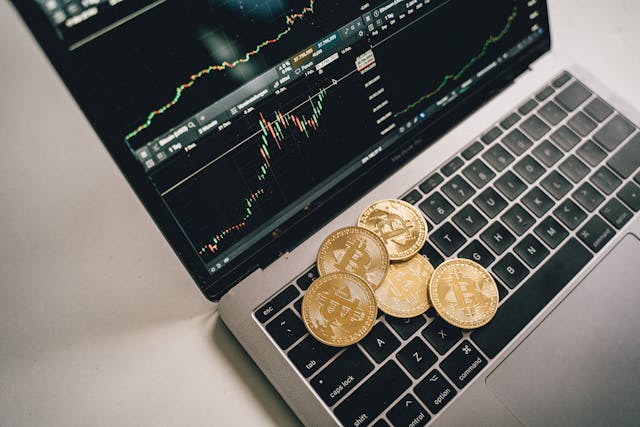Risks of Trading Crypto, A full Guideness for Beginners

Pal World Breed Calculator: A Comprehensive Guide
October 3, 2024
What are Toxic Assets ? Types, impacts
October 4, 2024Introduction to Cryptocurrency Trading
Cryptocurrency trading has exploded in popularity over the last decade. Bitcoin, Ethereum, and other altcoins are now household names, with millions of traders around the world jumping on the bandwagon. However, crypto isn’t all about huge profits and fast gains—it comes with significant risks. Whether you’re a beginner or an experienced trader, understanding these risks of trading crypto is essential for protecting your investment and managing your expectations.
Table of Contents
Market Volatility in Crypto
Why Crypto Prices Fluctuate Wildly
One of the most defining features of the cryptocurrency market is its extreme volatility. Prices of digital currencies can swing dramatically within hours, or even minutes. This happens because the market is relatively young and susceptible to sudden changes in investor sentiment.
Impact of External Events
Events like regulatory announcements, security breaches, or even tweets from influential people can cause crypto prices to rise or fall sharply. For example, a single tweet from a major figure in the crypto world can send the market into a frenzy, leading to panic buying or selling.
Security Risks of Trading Crypto
Hacks and Breaches
The crypto space has been a prime target for hackers since its inception. High-profile cases, like the Mt. Gox exchange hack in 2014, resulted in the loss of millions of dollars worth of Bitcoin. Even with increased security measures, the threat of hacks is always looming.
The Risk of Losing Your Private Key
In the decentralized world of crypto, you are your bank. While this offers freedom, it also comes with responsibility. Losing your private key means you lose access to your funds, with no way to recover them. Unlike traditional financial systems, there is no centralized authority to help retrieve your assets.
Regulatory Uncertainty
Changing Government Regulations
Cryptocurrencies operate in a gray area when it comes to regulations. Different countries have different approaches—some embrace crypto while others impose strict regulations or outright bans. This regulatory uncertainty can have a dramatic impact on the market, causing prices to crash or soar depending on the news.
How Regulation Affects the Market
Regulations can affect the usability and adoption of cryptocurrencies. For example, stricter rules on exchanges or tax reporting could make crypto less appealing to traders and investors.
Lack of Consumer Protection
No Recourse in Case of Losses
Traditional investments like stocks or bonds often come with certain legal protections. In contrast, cryptocurrency trading lacks consumer safeguards. If you lose money due to a hack, scam, or bad investment, there is often no way to recover your funds.
Fraudulent Schemes and Scams
The decentralized and anonymous nature of cryptocurrency makes it a breeding ground for fraud. From Ponzi schemes to phishing attacks, scammers constantly devise new ways to exploit unwary traders.
Liquidity Risks
What Is Liquidity and Why It Matters
Liquidity refers to how easily an asset can be bought or sold without affecting its price. In crypto, liquidity can vary widely across different exchanges and tokens. Poor liquidity makes it harder to execute trades at your desired price.
The Danger of Illiquid Assets
Illiquid cryptocurrencies are difficult to sell quickly without causing a sharp price drop. This can be particularly dangerous in volatile markets, where a delay in selling can lead to significant losses.
Leverage and Margin Trading Risks
How Leverage Can Exaggerate Losses
Leverage allows you to control a larger position with a smaller amount of capital. While this can amplify gains, it also magnifies losses. In volatile markets like crypto, leveraging can lead to massive losses in a short period.
The Dangers of Margin Calls
When using leverage, traders are at risk of margin calls, where the broker demands more capital to keep the position open. If you can’t meet the margin call, your position is automatically liquidated, resulting in a loss.
Psychological Risks
FOMO (Fear of Missing Out)
The crypto market is known for its hype, and FOMO can lead to poor investment decisions. Traders often rush into buying when they see prices soaring, only to face significant losses when the market corrects itself.
Emotional Decision-Making
Emotions play a huge role in crypto trading. Fear and greed can cloud your judgment, leading to rash decisions like panic selling or overbuying. To be successful, it’s important to trade based on strategy rather than emotions.
Technical Risks in Trading
Trading Platform Failures
Trading platforms are not immune to technical failures. Glitches, system outages, or maintenance can prevent you from executing trades at critical moments, which can lead to missed opportunities or unexpected losses.
Latency and Execution Issues
In fast-moving markets like crypto, execution speed is crucial. Delays in processing trades due to network congestion or platform issues can result in suboptimal trade prices, impacting your bottom line.
The Risk of Overtrading
Why Overtrading Can Be Hazardous
Overtrading—making too many trades in a short period—can be detrimental. It often leads to increased transaction fees and emotional burnout, which can ultimately hurt your overall returns.
The Importance of a Trading Strategy
Having a solid trading strategy is essential. Without a plan, it’s easy to get caught up in the excitement of the market and make impulsive trades, which can lead to losses.
Scalability Issues in Blockchain Networks
How Congestion Can Impact Transactions
Blockchain networks like Bitcoin and Ethereum face scalability issues. When transaction volumes increase, the network becomes congested, leading to slower processing times and higher fees. This can make it difficult to execute trades efficiently during peak times.
The Problem of Slow Confirmations
In congested networks, confirmation times for transactions can be painfully slow. This delay can affect your ability to move funds or complete trades quickly, leaving you vulnerable to market shifts.
Environmental Concerns and Their Impact
The Energy Consumption of Crypto Mining
Mining cryptocurrencies, especially Bitcoin, requires a tremendous amount of energy. This has led to growing concerns about the environmental impact of crypto mining, with some countries considering regulations that could limit or ban energy-intensive operations.
Growing Environmental Regulations
As environmental concerns grow, more countries may impose regulations on crypto mining or restrict access to energy resources. These changes can impact the overall profitability of mining and the supply of certain cryptocurrencies.
Counterparty Risk in Decentralized Finance (DeFi)
Understanding Smart Contract Failures
Decentralized Finance (DeFi) platforms rely on smart contracts to execute transactions without intermediaries. However, if a smart contract contains a bug or is hacked, users can lose their funds with little to no recourse.
The Role of Intermediaries in DeFi
Although DeFi platforms aim to eliminate intermediaries, there are still risks associated with counterparties. If a DeFi platform experiences a liquidity crisis, you may face challenges withdrawing your funds.
The Long-Term Viability of Cryptocurrencies
Could Major Cryptos Fail?
While Bitcoin and Ethereum dominate the crypto market, there’s no guarantee they will remain at the top. New technologies or regulatory challenges could lead to the decline of major cryptocurrencies, leaving investors with worthless assets.
The Role of Market Adoption
The success of any cryptocurrency depends on its adoption. If people and businesses stop using a particular cryptocurrency, its value could plummet. This makes it crucial to consider long-term viability when choosing which coins to invest in.
Conclusion
Cryptocurrency trading offers exciting opportunities, but it’s important to recognize the risks involved. From market volatility and security threats to regulatory uncertainty and psychological challenges, understanding these risks is essential for any trader. By staying informed and developing a solid trading strategy, you can navigate the crypto market more safely and effectively.
FAQs
1. What is the biggest risk in trading crypto?
The biggest risk is the market’s extreme volatility, which can lead to rapid and significant losses in a short period.
2. How can I protect myself from crypto scams?
To protect yourself, use reputable exchanges, enable two-factor authentication, and never share your private keys.


